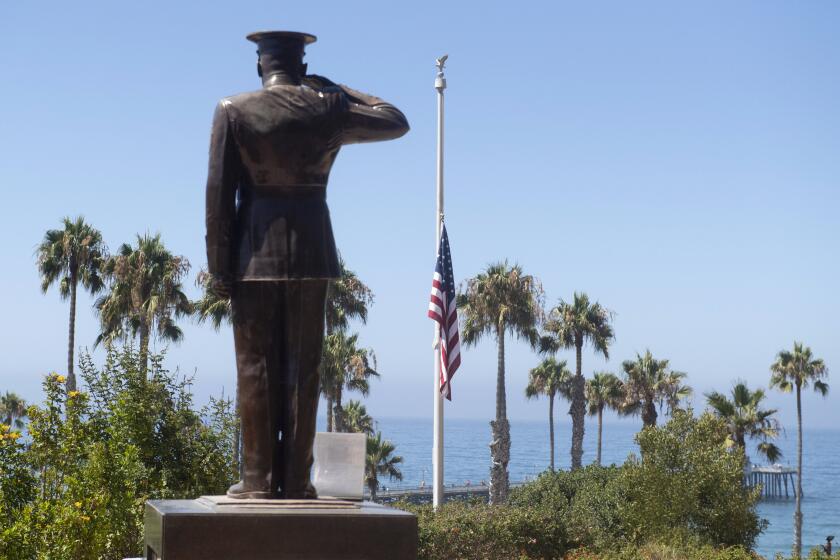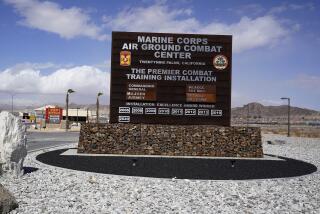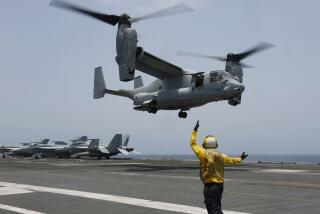Human remains, sunken amphibious vehicle found after Marine training accident kills 9
CAMP PENDLETON â Military search teams have located the amphibious assault vehicle that sank off the coast of San Clemente last week, killing nine service members aboard, Marine officials said Tuesday.
The U.S. Navyâs Undersea Rescue Command confirmed that human remains were identified along with the vehicle. The discovery was made using a remote-operated underwater video system from the HOS Dominator, a ship specializing in undersea search and rescue.
Marine officials said the transport vehicle is in approximately 385 feet of water. The Navy has called in equipment needed to recover the remains of eight missing service members â seven Marines and a sailor â and expects to perform the seafloor recovery operation at the end of the week.
The 26-ton assault amphibious vehicle began taking on water Thursday as 16 troops were returning from training on San Clemente Island, about 70 miles west of San Diego. Two other AAVs also involved in the training exercise helped with the rescue.
Eight Marines were safely pulled from the water. Marine Lance Cpl. Guillermo Perez, 20, of New Braunfels, Texas, was rescued but died at the scene.
Two Marines were hospitalized in critical condition, and one has since been upgraded to stable, the Marines said.
Seven Marines and one sailor were not found, despite a two-day, 1,000-nautical-mile search. The 15th Marine Expeditionary Unit suspended the search early Sunday morning, announcing the missing troops were presumed dead.
An amphibious assault vehicle carrying 15 Marines and one Navy sailor began to take on water during a training exercise, the Marine Corps says.
All were attached to Bravo Company, Battalion Landing Team 1/4 at Marine Corps Base Camp Pendleton. Those who died ranged in age from 18 to 23. They were junior in rank and assigned to the same unit, the Marines said.
Cpl. Wesley A. Rodd, 23, of Harris, Texas, was the oldest. Pfc. Bryan Baltierra, 18, of Corona, the youngest. Baltierra had just completed his first year in the Corps, having reported to boot camp in San Diego on July 29, 2019.
In addition to Rodd and Baltierra, both riflemen, the other missing service members whose bodies are presumed aboard the sunken Marine vehicle are:
- Lance Cpl. Marco A. Barranco, 21, a rifleman from Montebello
- Pfc. Evan A. Bath, 19, a rifleman from Oak Creek, Wis.
- U.S. Navy Hospitalman Seaman Christopher Gnem, 22, a corpsman from Stockton
- Pfc. Jack Ryan Ostrovsky, 21, a rifleman from Bend, Ore.
- Lance Cpl. Chase D. Sweetwood, 18, a rifleman from Portland, Ore.
- Cpl. Cesar A. Villanueva, 21, a rifleman from Riverside
The Marines late Sunday released the names of eight U.S. servicemen who went missing during a training exercise off San Clemente Island last week.
They were all young. Christopher Gnem was going to be married soon, according to a Facebook post by his fiancee, a fellow Navy corpsman.
Wesley Rodd recently became a father, according to a GoFundme.com fundraiser set up in his name. His wife, Jamie Rodd, wrote Monday on Facebook that she hopes for a miracle.
âPlease stop saying that they are gone we are praying for a miracle,â she wrote. âThey have still not been found.â
Other Marines whose families and friends have created fundraiser pages include Lance Cpl. Guillermo âWillieâ Perez and Lance Cpl. Chase Sweetwood, who was killed the day before his 19th birthday, according to Niki Stockdale, Sweetwoodâs aunt, who organized the fundraiser.
In an email, Stockdale said Sweetwood was born in San Diego, the first of five children. He lived in Chula Vista before moving to Oregon when he was around 10.
âHis 2 little sisters and 2 little brothers looked up to him in every way .... he just wanted to do something good on this earth,â Stockdale wrote, adding that her nephew worked hard to graduate from high school early so he could join the Marines before his 18th birthday. He succeeded, reporting to boot camp in San Diego on Dec. 17, 2018, a full seven months before turning 18.
âChase leaves behind a family who adored him,â Stockdale wrote. âWe are deeply lost without Chase in this world and our hearts are broken for his loss and the other young men who perished along with him.â
A dignified transfer of the deceased service members will occur after the recovery of their remains, Marine officials said.
On Friday, Gen. David Berger, the commandant of the Marine Corps, announced at Camp Pendleton that all waterborne operations of assault amphibious vehicles are suspended pending an investigation into the sinking.
Berger told Military.com on Monday that the Navy was using two autonomous search vehicles to find the missing vessel.
Marine assault amphibious vehicles have been in service since 1972 and have been involved in three mishaps around San Diego in the last 10 years.
One was involved in a 2017 accident on Camp Pendleton that sent 14 Marines and a sailor to the hospital with serious burns after the vehicle struck a gas line.
Another Marine died on Camp Pendleton in 2011 when one sank 300 feet offshore of the base in 30 to 40 feet of water.
Assault amphibious vehicles, commonly called âAmtracs,â can carry up to 24 troops â three crew and 21 in the transport compartment. All of the missing and dead troops were in the transport compartment of the vehicle, a Marine spokesman told the Union-Tribune on Monday.
San Diego Union-Tribune staff writer Dyer wrote from Camp Pendleton and Times staff writer Sheridan from Los Angeles.
More to Read
Sign up for Essential California
The most important California stories and recommendations in your inbox every morning.
You may occasionally receive promotional content from the Los Angeles Times.
![San Clemente Island, viewed from a shuttle aircraft that regularly flies military and civilian personnel to the U.S. Navy-owned land mass 68 miles from San Diego. The military airstrip is seen at the northern end. The southern end has the only remaining ship-to-shore bombardment range in the U.S. The Navy has supported an extensive ecological restoration of endangered plants and animals on the island. [For the record, July 24, 2013: An earlier version of this caption incorrectly said the military airstrip was at the southern end of the island, and the bombardment range to the north.]](https://ca-times.brightspotcdn.com/dims4/default/62102ac/2147483647/strip/true/crop/2024x1349+12+0/resize/840x560!/quality/75/?url=https%3A%2F%2Fcalifornia-times-brightspot.s3.amazonaws.com%2F27%2F1c%2F485caad18db60fdd718a1f97ed77%2Flat-1479178donbart-la0010504175-20130717)













